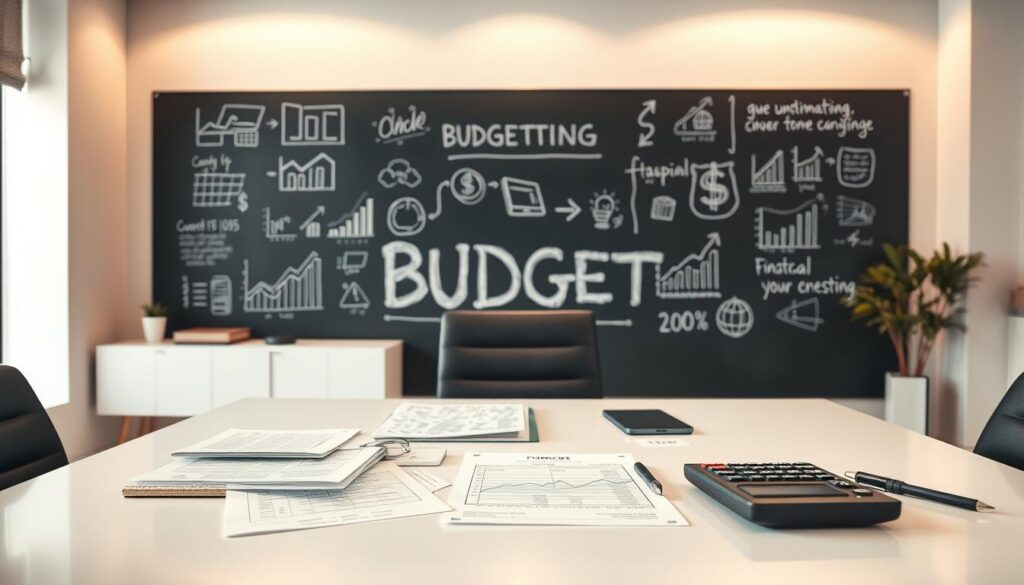Budgeting and forecasting are key to good financial planning. They help guide your organisation’s direction. By understanding budgeting, you can match your money with your goals and control spending well.
Forecasting helps you make smart choices about buying things and using resources. It’s all about planning ahead. This way, you can make better decisions for your business.
By using a clear plan, you can get your budget and forecasts right. This shows what your finances might look like in the future. Budget forecasting is very important for businesses to handle financial challenges well. Learn more about these important topics in this informative article.
Table of Contents
Key Takeaways
- Understanding the different types of budgets such as operating, capital, and zero-based.
- Recognising the key elements like fixed vs. variable costs and income projections.
- Evaluating the significance of various forecasting methods including quantitative and qualitative approaches.
- Addressing common challenges, such as market volatility and data inaccuracies.
- Implementing best practices for regular budget monitoring and stakeholder engagement.
Understanding Budgeting and its Core Components
Budgeting is key for managing money, important for both people and businesses. It helps create a plan for how money will be spent and earned over time. This plan guides decisions and helps things run smoothly.
Defining Budgeting
Understanding budgeting means knowing how to use your money wisely. It includes both what you expect to earn and what you will spend. This way, you can make choices that help you reach your goals.
Key Elements of a Budget
A budget has several important parts. Fixed costs, like rent and salaries, stay the same. But variable costs change based on how much you sell or produce. Knowing how much money you’ll make is also key.
Capital expenditures (CapEx) help decide on big investments for the future. You can budget for a year, quarter, or month, depending on your needs. Each option has its own benefits for planning your finances.
The Importance of Budgeting in Financial Planning
Budgeting is key to good financial planning. It helps set financial goals and manage money well. A clear budget lets you use resources wisely, focusing on the best investments.
It’s not just about numbers. Budgeting builds discipline and planning skills in your team.
Setting Financial Goals
Setting financial goals is essential for budgeting success. It helps you focus on what’s important and work towards financial stability. A detailed budget lets you see both short and long-term goals clearly.
When setting goals, think about how they fit into your bigger vision. This ensures your efforts grow your business and keep it stable.
Tracking Performance and Managing Costs
Regularly tracking your budget is critical. It lets you spot and fix any issues early. This way, you can keep costs down and use resources better.
It makes your team flexible and ready for changes. And it keeps your financial goals in sight.
The Role of Forecasting in Budgeting
Forecasting is key in budgeting, giving insights into future finances. It uses past data and market analysis. Knowing the difference between forecasting and budgeting is vital for good financial planning.
Budgeting sets clear financial goals for a period. Forecasting, on the other hand, adjusts these goals as new data comes in. This makes businesses more adaptable to economic changes.
Forecasting vs. Budgeting: Understanding Distinct Purposes
The main difference is their purpose. Budgeting is a fixed plan for income and expenses. Forecasting, though, is about ongoing analysis to adjust these plans as needed.
This flexible approach helps organisations deal with changes in revenue and unexpected costs. It improves their financial management.
Types of Forecasting and Their Impact
There are various types of forecasting, each with its own role:
- Financial Forecasting: Predicts income and expenses, vital for cash flow.
- Operational Forecasting: Helps with daily decisions, affecting workflow and resource use.
- Strategic Forecasting: Supports long-term planning and market trend analysis, aligning business goals with market changes.
These forecasting types shape the budgeting process and guide decision-making. They help in creating strong financial strategies, even when things are uncertain.
Benefits of Integrating Forecasting into Budgeting
Adding forecasting to budgeting brings many benefits. It helps you better manage your finances. This mix improves your financial planning and decision-making.
It lets you use resources well. This ensures you meet both short-term needs and long-term goals.
Enhanced Financial Accuracy
Good forecasting makes your budget more accurate. It turns guesses into useful information. This makes your financial plans more reliable.
With better data, you can spend wisely. This cuts down on unnecessary costs. It also lowers financial risks.
Companies that do this well see big improvements. They meet their goals more often, in fields like healthcare and manufacturing.
Proactive Decision-Making Strategies
Forecasting helps your team make smart decisions ahead of time. It lets you prepare for market changes and other issues. This way, you can adjust quickly when needed.
Being able to act fast helps avoid problems. It also opens up new chances for growth. Using a rolling forecast helps stay flexible, updating plans monthly.
For more on this, check out how budgeting and forecasting work together in today’s finance world.
Forecasting Techniques for Effective Budget Planning
Good budget planning uses both numbers and expert opinions. These methods give a clear picture of what money might come in and go out. This helps businesses face challenges with confidence.
Quantitative Forecasting Methods
Quantitative forecasting uses stats to spot trends in past data. It lets you guess future budgets based on what happened before. It also mixes different data to make predictions more accurate. Using these methods makes budget forecasts more reliable, mainly when the market is steady.
Qualitative Forecasting Insights
Qualitative forecasting adds value by using expert views and market studies. It’s great when past data is not reliable. Mixing both types of forecasting makes financial plans stronger and more flexible. For more on budgeting, check out the types of business budgets online.
| Forecasting Method | Description | Use Case |
|---|---|---|
| Time-Series Analysis | Statistical technique that uses historical data to predict future outcomes. | Predicting sales based on past performance trends. |
| Causal Forecasting | Relates to establishing a cause-and-effect relationship between variables. | Estimating revenue based on marketing expenditure. |
| Market Research | Gathering qualitative data from consumers and industry experts. | Understanding shifts in consumer preferences. |
| Scenario Analysis | Examining various possible future events on financial outcomes. | Evaluating risk under different economic conditions. |
Utilising Predictive Analytics for Budget Forecasting
Predictive analytics is key for businesses wanting to manage their finances well. It uses past data to spot trends and predict the future. This helps in making better budgets and using resources wisely.
Leveraging Historical Data
Companies look at past data to improve their budgeting. This helps them understand their finances better and predict the future. It lets them adjust budgets as needed.
Scenario Analysis and Its Applications
Scenario analysis is vital in financial forecasting. It lets you see how different scenarios might play out. This prepares your business for different financial situations, reducing risks.
It also helps in making the most of your resources and supports smart strategic decisions. For more on variance analysis, check out this resource.
Common Challenges in Budgeting and Forecasting
Budgeting and forecasting are key in managing finances, but they face many hurdles. Market changes make it hard to predict the future. Also, the accuracy of data used is critical. If data is wrong, forecasts can be off, leading to bad decisions.
Dealing with Market Volatility
Market ups and downs can mess up even the best budgets. Companies might see their growth plans fail due to unexpected events. To tackle this, businesses should use flexible forecasting that can change quickly.
Overcoming Data Inaccuracies
Good data is essential for solid forecasts. But, errors in data can mess up budgets. To fix this, regular checks and updates on finances are needed. A clear method for collecting and checking data helps keep forecasts reliable.
Best Practices for Budgeting and Forecasting
Effective budgeting and forecasting are key to a company’s financial health. By following the best practices, you can stay flexible and precise in your financial planning. This part will focus on two important points: the need for regular monitoring and the importance of engaging stakeholders.
Regular Monitoring and Adjustment
Regularly checking your budget lets you make changes when necessary. Having a set review schedule helps you compare actual results with your initial plans. This way, you can spot any differences and make smart choices.
This approach is essential for keeping your finances stable and reaching your long-term goals.
Engaging Stakeholders in the Process
Getting input from different departments makes your budgeting more accurate. When stakeholders from various areas are involved, you get a better view of the situation. Their contributions improve the forecasts and make everyone feel responsible for the financial outcomes.
Strategic Planning with Budget Forecasting
Effective strategic planning with budget forecasting is key to aligning budgets with goals. It makes sure financial resources are used to support the organisation’s overall aims. By linking budget forecasts with strategic goals, you can focus on investments that drive growth and efficiency.
To help with budget alignment, consider these strategies:
- Do a deep analysis of past financial performance to guide future plans.
- Get stakeholders involved in budgeting to make sure everyone knows the financial limits.
- Set up budget frameworks that cover both immediate needs and long-term visions.
Technological Tools for Enhanced Budgeting and Forecasting
In today’s world, using tech for budgeting can really help. Advanced software makes managing data easier and more accurate. This leads to better analysis and smarter budgeting.
Businesses can now use modern tools that make budgeting and forecasting faster. This is a big step up from old ways like spreadsheets.
Utilising Advanced Software Solutions
Financial places use special software for detailed analysis and forecasting. This software automates tasks and gives real-time financial health insights. It turns data into easy-to-understand dashboards.
AI in these tools makes budgeting and forecasting even better. It models trends and variables. This means you can focus on big goals, not just data entry.
Cloud-based platforms make sharing info easy, helping everyone make better decisions. This makes budgeting and forecasting more accurate and efficient. For more on this, check out detailed resources on financial tech.
Financial Forecasting for Effective Planning
Effective financial forecasting is key for any organisation’s success. It involves creating detailed financial models. These models predict future income and costs, taking into account different scenarios and market changes.
Using these models, businesses can prepare for economic changes. They combine past data with predictive analytics. This helps in making informed financial decisions.
Creating Comprehensive Financial Models
To plan well, you need to build strong financial models. They have several important parts:
- Identifying key factors that affect finances
- Using statistics to analyse data
- Adding historical performance data
- Doing scenario tests to spot possible issues
This careful process helps create a solid forecasting system. The results should be clear and easy for everyone to see. They should also be updated regularly to show the changing financial landscape.
Keeping an eye on and updating these models helps avoid risks. It makes businesses more flexible. This leads to better decision-making, growth, and stability in financial planning.
For more on budget management, check out this link.
Conclusion
Budgeting and forecasting are key to your business’s financial health. Learning to use these tools well helps you face financial challenges with confidence. You can improve your financial predictions and keep your business running smoothly.
Working with your team on these plans makes sure everyone is on the same page. Regularly checking and updating your forecasts helps you stay ahead in a changing market. A solid budget plan boosts your success chances and supports your business’s long-term growth.
If you want to learn more, check out resources like budgeting for a business launch. These resources can deepen your understanding and help you reach your goals with focus and determination.
FAQ
What is the role of forecasting in budgeting?
Forecasting is key in budgeting. It predicts future money matters based on past data and trends. This helps businesses make smart choices for now and the future.
Why is budget forecasting important for businesses?
Budget forecasting is essential. It lets businesses know what to expect financially. This way, they can plan better, set achievable goals, and adjust strategies as needed.
What are some benefits of integrating forecasting into budgeting?
Mixing forecasting with budgeting makes finances more accurate. It also helps in better planning, making decisions ahead of time, and managing risks by seeing market changes.
What are the main forecasting techniques used for effective budget planning?
Main techniques include quantitative and qualitative methods. Quantitative uses stats like time-series analysis. Qualitative relies on expert views and market studies.
How can predictive analytics assist in budget forecasting?
Predictive analytics helps by looking at past data for patterns. This lets businesses prepare for different market situations and make smart choices.
What challenges do businesses face in budgeting and forecasting?
Businesses struggle with market changes and data errors. These can make forecasts useless. Also, wrong or old data can lead to bad predictions.
What best practices should be followed in budgeting and forecasting?
Best practices include keeping financial plans up to date and involving all departments. Regular reviews help check how plans are doing against reality.
How should strategic planning incorporate budget forecasting?
Strategic planning should link budget forecasts with business goals. This way, investments can support growth and returns. It also ensures spending stays within limits.
What technological tools can enhance budgeting and forecasting processes?
New software helps gather data better, boosts accuracy, and offers quick insights. It moves businesses from old spreadsheet methods to more modern, integrated ones.
How can a financial model aid in effective financial forecasting?
A detailed financial model uses past data and analytics to forecast income and spending. It considers different scenarios, helping in making smart, strategic decisions.









